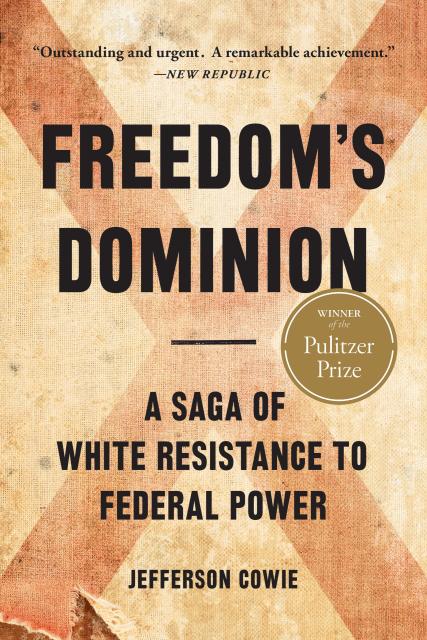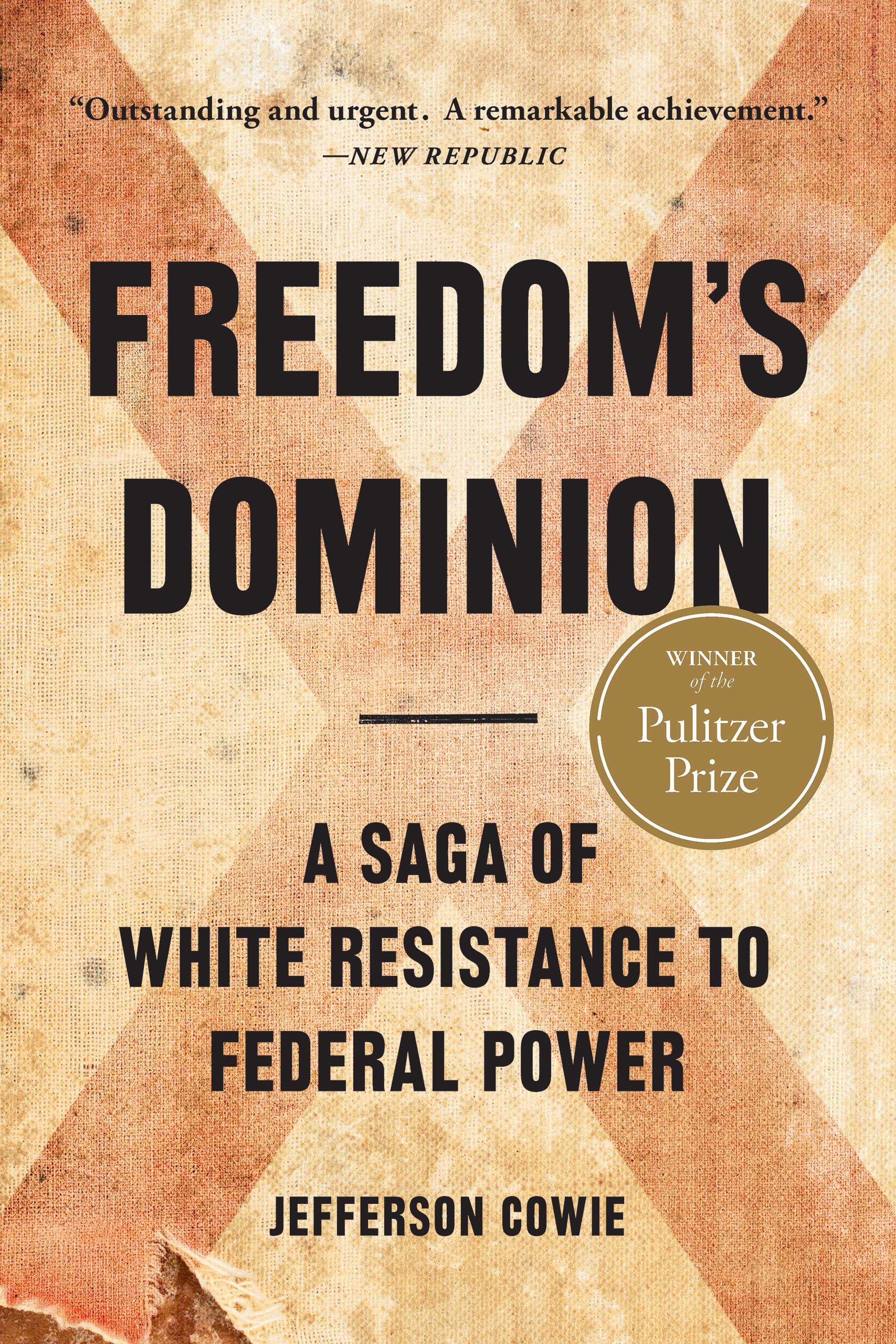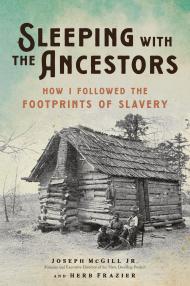By clicking “Accept,” you agree to the use of cookies and similar technologies on your device as set forth in our Cookie Policy and our Privacy Policy. Please note that certain cookies are essential for this website to function properly and do not require user consent to be deployed.
Freedom’s Dominion (Winner of the Pulitzer Prize)
A Saga of White Resistance to Federal Power
Contributors
Formats and Prices
Price
$21.99Price
$28.99 CADFormat
Format:
- Trade Paperback $21.99 $28.99 CAD
- ebook $15.99 $20.99 CAD
- Hardcover $35.00 $44.00 CAD
- Audiobook Download (Unabridged) $38.99
This item is a preorder. Your payment method will be charged immediately, and the product is expected to ship on or around January 2, 2024. This date is subject to change due to shipping delays beyond our control.
Also available from:
American freedom is typically associated with the fight of the oppressed for a better world. But for centuries, whenever the federal government intervened on behalf of nonwhite people, many white Americans fought back in the name of freedom—their freedom to dominate others.
In Freedom’s Dominion, prizewinning historian Jefferson Cowie traces this complex saga by focusing on a quintessentially American place: Barbour County, Alabama, the ancestral home of political firebrand George Wallace. In a land shaped by settler colonialism and chattel slavery, freedom became a weapon. With freedom as their cry, white Americans seized Native lands, championed secession, overthrew Reconstruction, questioned the New Deal, and fought against the civil rights movement.
Through a riveting account of two centuries of local clashes between white people and federal authorities, Freedom’s Dominion offers a radically new history of federal power, democracy, and American freedom. This history summons us today to embrace a vigorous model of American citizenship, backed by a federal government that is not afraid to fight the many incarnations of the freedom to dominate.
-
“A resonant account of an Alabama county in the 19th and 20th centuries shaped by settler colonialism and slavery, a portrait that illustrates the evolution of white supremacy by drawing powerful connections between anti-government and racist ideologies.”Pulitzer Prize jury
-
“Important, deeply affecting—and regrettably relevant… essential reading for anyone who hopes to understand the unholy union, more than 200 years strong, between racism and the rabid loathing of government…White men did all this in Barbour County, by design and without relent, and Cowie’s account of their acts is unsparing. His narrative is immersive; his characters are vividly rendered.”New York Times Book Review
-
“Outstanding and urgent...a remarkable achievement.”New Republic
-
“A gem...Synthesizing brilliant research in fluent prose, and writing with an indignation that’s all the more damning for being understated.”George Packer, Atlantic
-
"A convincing case."Eric Foner, London Review of Books
-
“A great read informed by mountains of research.”CHOICE Connect
-
“[G]ripping and haunting…Cowie’s meticulous accumulation of detail and candid assessments…make for distressing yet essential reading. This is history at its most vital.”Publishers Weekly (starred review)
-
“A powerful history showing that White supremacist ideas of freedom are deeply embedded in American politics.”Kirkus
-
"Jefferson Cowie has a knack for publishing instant classics: books that change historians' conversations. This is his most extraordinary yet. With eloquence and with brilliance, he delves deep into the annals of a specific place, Barbour County, Alabama, in order to excavate the foundations of America's darkest and most enduring story: how 'freedom' became a national alibi for cruelty, inequity, and reaction. As soon as I finished reading it, I wanted to start over and absorb it all over again."Rick Perlstein, author of Reaganland
-
“Jefferson Cowie has given us a deep history of the long war on the federal government—especially when it came to policies advancing class and race equality, of the evolution of White grievance politics, and of a new way of thinking about the psychic structure of American Exceptionalism. With eloquent, precise prose, Cowie clears away the cobwebs to reveal a national malady long in the making.”Greg Grandin, Pulitzer Prize-winning author of The End of the Myth
-
“A fascinating book, Freedom’s Dominion takes us to the states’-rights stronghold of Barbour County, Alabama. Barbour was the birthplace of Governor George Wallace, whose infamous defense of segregation described integration as tyranny, segregation as freedom, and equal access to the ballot as a threat to individual rights. Wallace’s views illustrate the confounding interdependence of ideas about freedom and oppression in American politics—as does Barbour County’s long history of state-building rooted in antiblack violence, white supremacist rule, and Indian land dispossession. Freedom’s Dominion offers a searing account of that history that leaves one wondering whether American freedom can ever be disentangled from the causes it has supported.”Mia Bay, author of Traveling Black
-
“Jefferson Cowie’s Freedom’s Dominion is a magisterial narrative history of white grievance politics. Cowie reveals the origins of these often hypocritical and confounding perspectives, in which those who stole, enslaved, and segregated would themselves claim to be victims of federal overreach, even as they oppressed so many others. Cowie’s terrific book explains the Southern roots of that racialized ideology and reveals how one of the most influential segregationist rhetoricians of the 1960s helped repackage this powerful form of regional white identity politics for the rest of the nation.”William Sturkey, author of Hattiesburg
-
“Freedom’s Dominion covers centuries of American history in Eufaula, Alabama, from the violence of settler colonialism through the ascent of arch-segregationist George Wallace, the region’s most famous native son. Jefferson Cowie is interested in how people in power—almost always white men—used claims of freedom to dominate and enslave others, and how they articulated domination as resistance to a tyrannical federal government. This history has urgent implications for how we understand white supremacist and anti-government politics today.”Kathleen Belew, author of Bring the War Home
- On Sale
- Jan 2, 2024
- Page Count
- 512 pages
- Publisher
- Basic Books
- ISBN-13
- 9781541605121
Newsletter Signup
By clicking ‘Sign Up,’ I acknowledge that I have read and agree to Hachette Book Group’s Privacy Policy and Terms of Use







